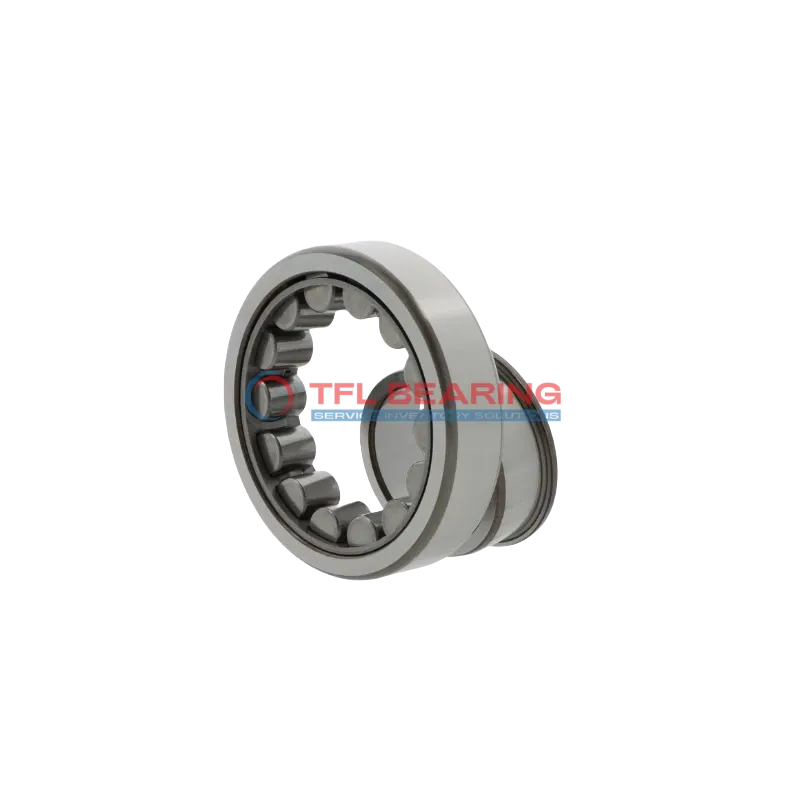
The NJ 208 ECJ is a single-row cylindrical roller bearing with a 40mm bore and 80mm outer diameter, crafted from sturdy chrome steel. It handles combined loads up to 13950 lbf and spins smoothly at speeds up to 11000 RPM.
Its open design allows easy lubrication with grease or oil, while the steel cage ensures stable performance. The bearing operates well in temperatures from -30°C to 110°C.
This model is interchangeable with SKF bearings, making it a practical choice for replacements. Ideal for applications like gearboxes or industrial machinery where radial and axial loads are present.
Weighing just 0.39kg, it’s lightweight yet durable for its size. Compliant with RoHS and REACH standards for safe use.
"*" indicates required fields
Performance Features of NJ 208 ECJ Bearing
NJ 208 ECJ Bearing is built with chrome steel rings and rollers, offering strong resistance to combined loads.
Its dynamic radial load capacity reaches 13950 lbf, ensuring reliable performance in demanding conditions.
The steel cage keeps the rollers centred, reducing friction and extending service life.
With a maximum speed of 11000 rpm, it balances durability and efficiency.
How Does NJ 208 ECJ Bearing Reduce Friction?
NJ 208 ECJ Bearing’s precision-engineered rollers and raceway design minimise friction during operation.
The chrome steel construction ensures smooth movement, even under heavy radial loads.
Its open design allows for easy lubrication with grease or oil, further reducing wear.
This makes it suitable for high-speed applications up to 11000 rpm.
Engineered for Precision: NJ 208 ECJ Bearing
NJ 208 ECJ Bearing features a single-row cylindrical design for accurate load distribution.
The inner ring construction enhances stability, handling both radial and axial displacements.
With a temperature range of -30° to 110°C, it performs reliably in various environments.
Its compliant RoHS and REACH status ensures it meets international standards.
Steel vs Ceramic Bearings: Strengths of NJ 208 ECJ Bearing
NJ 208 ECJ Bearing uses chrome steel for both rings and rollers, providing excellent durability.
This material choice ensures high resistance to wear and tear in industrial applications.
The steel cage design maintains roller alignment, optimising performance under combined loads.
Weighing just 0.39 kg, it offers a robust yet lightweight solution for machinery.
Why Choose NJ 208 ECJ Bearing for Precision Tasks?
NJ 208 ECJ Bearing’s tight tolerances ensure precise operation in critical applications.
The cylindrical roller design distributes loads evenly, reducing stress on components.
Its permissible axial displacement of 1.4 mm accommodates slight misalignments.
This makes it ideal for tasks requiring both accuracy and durability.
Industrial Uses of NJ 208 ECJ Bearing
NJ 208 ECJ Bearing is commonly used in industrial machinery like conveyor systems and gearboxes, where its cylindrical roller design handles combined loads efficiently. The open seal type allows for easy lubrication, making it suitable for high-speed operations up to 11000 rpm.
Key Fields for NJ 208 ECJ Bearing
In automotive applications, NJ 208 ECJ Bearing supports components such as transmissions and differentials, thanks to its durable chrome steel construction. Its metric sizing ensures compatibility with a wide range of vehicle models.
Perfect Fit for Automation: NJ 208 ECJ Bearing
NJ 208 ECJ Bearing is ideal for robotic arms and automated production lines, where precision and reliability are essential. The steel cage design enhances stability, even under continuous use.
Medical vs Industrial: Where NJ 208 ECJ Bearing Excels
While NJ 208 ECJ Bearing performs well in industrial settings, its precision also makes it suitable for medical imaging devices. The temperature range of -30° to 110°C ensures consistent performance in various environments.
What Makes NJ 208 ECJ Bearing a Preferred Choice?
NJ 208 ECJ Bearing’s ability to handle both radial and axial loads makes it versatile for applications like pumps and compressors. Its grease or oil lubrication options provide flexibility for different operational needs.
"*" indicates required fields